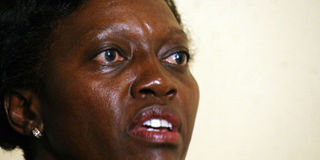Karua on the spot over Artur saga

The ghost of the Artur brothers came back to haunt Gichugu MP Martha Karua in Parliament November 30, 2010 with MPs accusing her of attempting to block a House probe on the Armenians. FILE
The ghost of the Artur brothers came back to haunt Gichugu MP Martha Karua in Parliament Tuesday afternoon.
Ms Karua, the former Justice minister, found herself in unfamiliar waters as her past conduct came into light with MPs calling her to account for her interference in the Parliamentary inquest into the scandal involving the two Armenians.
The report –re-tabled last week by Imenti Central MP Gitobu Imanyara (CCU)--adversely mentions President Kibaki and key government officials. The report is awaiting debate in Parliament.
On Tuesday, Mr Musa Sirma (nominated, ODM), a former member of the House committee which carried out the inquiry, summoned the Artur’s ghosts when he tabled a letter written in June 2006 by Ms Karua, in which she sought “the Speaker’s intervention to restrain the (joint) committee from proceeding with the inquiry in breach of the Constitution and the law".
“It’s incumbent upon ministers to know that they’ll be sitting like (Ms) Karua and not be able to account for the time they served as ministers,” said Mr Sirma as he tabled the document.
Ms Karua, who was then also the deputy Leader of Government Business in Parliament, had noted that the “legislature cannot purport to usurp the role of the Executive” in carrying out a parallel investigation.
“While the government fully supports a vibrant Parliament, it is our view that the current effort by the committee is misdirected and amounts to undermining parliamentary practice, respect and authority,” wrote Ms Karua.
She cited “lack of political neutrality” among House committees and hinted that perhaps the committees may turn out to be political tools targeting political rivals.
“Composed as they are, of members of different and antagonistic political parties occasionally more than eager to score political points and settle political differences, Parliamentary Committees are not necessarily the best method of getting to the bottom of serious national issues,” she wrote in the letter.
Following Ms Karua’s protests back then, the then Speaker Francis ole Kaparo said Parliament’s oversight mandate over the Executive ought not to be limited to instances where the Executive fails to audit itself and gave Parliament the greenlight to go ahead with its inquiry.
The tabling of the letter came after Ms Karua had challenged Mr Sirma to “substantiate” that she actually in the past, sought to block the House from investigating the Armenian brothers who hobnobbed with the high and mighty in government.
Though Ms Karua’s initial sentiments alluded to the fact that there was no such letter, she conceded that the letter existed and said that she is, in fact, the one who had tabled it as a Point of Order (procedural intervention).
She accused Mr Sirma of attempting to cast aspersions on her character, and tabled a copy of the Hansard.
"There’s nothing I do that I will fail to own up to,” she said.
"Unless there are two Martha Karuas, what has changed for her to seek the tabling of the Artur borthers report, yet she objected the investigations,” posed Dr Boni Khalwale (Ikolomani, New Ford Kenya).
Mr John Mbadi (Gwassi, ODM) questioned if a letter written to the Speaker can constitute a Point of Order.
But the indefatigable Ms Karua said MPs were perhaps “criminalising” the seeking of interventions and that by her being questioned for seeking the Speaker’s directions was an “abuse of democracy”.
"I don’t deal cards under the table. I am asking for the Kiruki Commission (of Inquiry) report which I never saw even as a minister then. I did not stop the House,” said Ms Karua.
She tabled another copy of the Hansard in which she is quoted terming the Artur scandal as an “embarrassment to the government".
But in conclusion, Mr Sirma said: “You opposed the report, it is not correct to ask for it now. You must own up. She did other things, she rubbished the IPPG (Inter-parliamentary parties group) deal as a gentleman’s agreement,” he said.
The rubbishing of the IPPG deal, which proposed that there has to be consultations in picking commissioners to the electoral commission, Mr Sirma said, is the source of the faulty electoral commission, which conducted dubious elections and led to the post-election violence.
In summary of the whole episode, House Speaker Kenneth Marende said that the letter “spoke for itself” and asked Kenyans to acquaint themselves with its contents.




